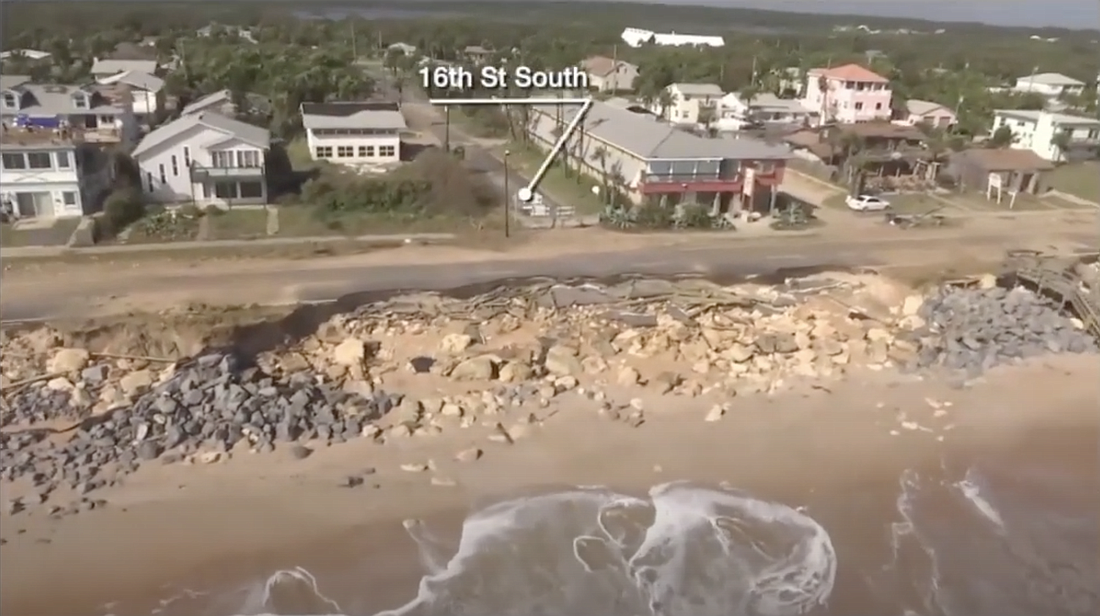- December 13, 2025

After Hurricane Matthew ripped out much of the county's beach and portions of State Road A1A, the Flagler County government worked hard to get the Army Corps of Engineers' support for a multimillion dollar project to fortify the beach — and thereby protect nearby property — with additional sand dredged from offshore.
"I think if somebody refuses, we need to take the land; we need to eminent domain the part that’s east of A1A of their land."
— GREG HANSEN, county commissioner
But there's a problem: To do it, the county needs individual beachfront homeowners' and businesses' permission, in the form of an easement, to enter their property and deposit the sand. And about 15 residents and businesses have either neglected to reply to the county or have indicated that they won't participate.
Those properties, if they're not fortified, would create "breach points" where water would wash in during a storm.
"That breach point will compromise everything behind the fortifications that we do to the coastline," County Administrator Jerry Cameron told County Commissioners at a County Commission May 18.
One commissioner, Greg Hansen, suggested that the county use eminent domain to acquire those properties.
County Attorney Al Hadeed began his presentation on the subject of the easements with a video, shot from the air, of the county's damaged coastline immediately after Hurricane Matthew.
"You saw that destruction, and that was because we don’t have a fortified beach," he said.
"The part that I don’t understand is how some of them can sacrifice the safety of their neighbors. ... They are putting them at real risk."
— AL HADEED, Flagler County attorney
So far, Hadeed said, the county has been able to secure 104 easements. Another 22 property owners are in the process of agreeing or have indicated that they're amenable to doing so. Then there are 15, including two businesses, where the county isn't getting a response that gives county staff confidence that they'll be able get an easement. Too many potential breach points would endanger the project, Hadeed said.
"The part that I don’t understand is how some of them can sacrifice the safety of their neighbors — whether it be their adjoining neighbors who have decided to participate, or west of them," Hadeed said. "They are putting them at real risk."
The project, Hadeed reiterated, is at no cost to property owners, and adds value of approximately $183,000 per 50 linear feet of beachfront.
"It is not understandable," Hadeed said. "To me, I can not understand why someone would not instantly sign if they apprised themselves of all the facts."
People move back and forth between those categories, Hadeed said — for instance, initially replying that they're willing to record an easement, but then neglecting to reply to further communication.
Some of the remarks county staff are hearing when they speak to the holdouts are "really not understandable," Hadeed said – like the person who assumed their neighbor's sand would fill in for them and eliminate their need to participate, or the people whose reaction has been to suspect the county government of nefarious motives and ask why the county was undertaking the project "all of a sudden."
There's an easy answer to that.
"One of the principal reasons why we have the project today is because we were on national news — national news — after Hurricane Matthew," Hadeed said. "Because we got the national attention, it made everybody sit up and notice. ... There's no plot here. We're just trying to protect what we have and avoid these kinds of catastrophic losses."
The existence of holdouts delays the construction because the project can't be put out to bid.
"I think if somebody refuses, we need to take the land; we need to eminent domain the part that’s east of A1A of their land — take it, and be damned with them," Hansen said. "We can not have gaps in this wall that we're going to build."
Hadeed said the county is still trying to use education and persuasion. For instance, he said, the Topaz Motel agreed to sign after meeting with Commissioner David Sullivan. Hadeed expected he might pair commissioners with residents or businesses to reach out to.
"Mr. Hansen has suggested a legal remedy," Hadeed said. "Well there may be an intergovernmental remedy, in addition, where we need to do something with our interagency partners to help move the ball and get the thing done. There’s a lot of different things that theoretically would be on the table. We don't know what we're going to want to deploy."
He asked for county commissioners' support in the form of the "broadest authorization that you can give us" to do what is needed to secure the remaining easements over the next two weeks before the next commission meeting. Commissioners unanimously agreed.